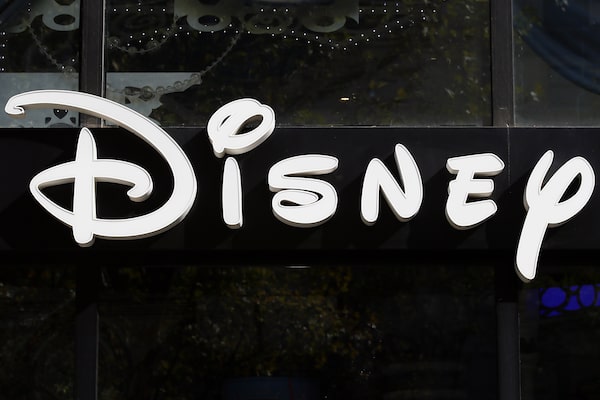
The sign at a Disney store in Paris.Francois Mori/The Associated Press
Walt Disney DIS-N shareholders backed Chief Executive Bob Iger and other company directors on Wednesday, defeating a campaign by activist investors who argued the storied entertainment giant had underperformed in the streaming-television era.
The vote to re-elect all 12 of Disney’s current board members, announced at the company’s annual shareholder meeting, ended a multimillion-dollar, mud-slinging battle launched by billionaire Nelson Peltz and Blackwells Capital.
“With the distracting proxy contest now behind us, we’re eager to focus 100 per cent of our attention on our most important priorities: growth and value creation for our shareholders and creative excellence for our consumers,” Iger said.
After the results were announced, Disney shares extended an earlier loss and were down 1.8 per cent at $120.56 on Wednesday afternoon.
While Disney’s board held off the activists’ challenge, it still must find a successor to Iger before his scheduled retirement at the end of 2026. Board members recently sought to reassure shareholders that they were taking the matter seriously and vetting internal and external candidates.
Peltz, CEO of Trian Fund Management, and Blackwells were seeking five seats between them on Disney’s board. The activists argued the $225-billion media company has bungled its CEO succession planning, lost its creative spark and failed to properly harness new technology.
“All we want is for Disney to get back to making great content and delighting consumers and to creating sustainable long-term value for all of us,” Peltz said at the meeting before the results were announced.
“Regardless of outcome of today’s vote, Trian will be watching the company’s performance,” he added.
The tussle was bitter and closely watched, serving as a referendum on Disney’s efforts to reinvigorate its film and television franchises, make its streaming business profitable and find partners to help build sports network ESPN’s digital future.
Both sides spent millions of dollars on campaigns trying to persuade voters and launched public and personal attacks.
Peltz had been seeking a board seat for himself and for former Disney Chief Financial Officer Jay Rasulo. Disney said the pair lacked the necessary skills, offered “nothing new” in their suggestions for improvement and noted that Rasulo had been passed over to succeed Iger.
Peltz at one point responded that Disney was “stupid” in opposing him, arguing that he was trying to help Iger.
Iger received the backing of 94 per cent of voting shareholders. Peltz was supported by 31 per cent.
Trian was Disney’s fifth-biggest shareholder with a 1.76 per cent stake as of Dec. 31, according to LSEG data. The hedge fund’s $3-billion bet on Disney was largely responsible for its underperformance last year relative to its activist peers, according to financial details provided to Reuters by a Trian investor.
Disney’s shares peaked in March 2021 at $201.91 when the company was gaining streaming subscribers. The stock price later fell as the streaming division kept losing money. Disney’s board fired then-CEO Bob Chapek, bringing Iger back to the helm.
Disney shares are up about 33 per cent so far this year, lifted by positive earnings and initiatives such as a $1.5-billion investment in “Fortnite” maker Epic Games and a sports streaming app with Fox Corp and Warner Bros Discovery.
Iger, 72, secured a string of public endorsements rarely seen in proxy fights. They included “Star Wars” creator George Lucas, members of the Disney family, JPMorgan Chase CEO Jamie Dimon and Emerson Collective founder Laurene Powell Jobs.
Disney also received the backing from proxy advisory firm Glass Lewis. Another advisory firm, Institutional Shareholder Services, had recommended Peltz, and pension fund giant California Public Employees Retirement System (CalPERS) backed Peltz and Rasulo.